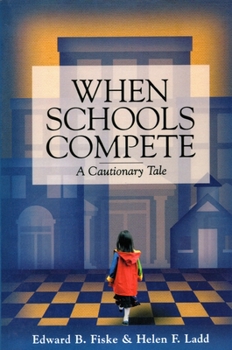When Schools Compete: A Cautionary Tale
Select Format
Select Condition 
Book Overview
" In 1989 New Zealand embarked on what is arguably the most thorough and dramatic transformation of a compulsory state education system ever undertaken by an industrialized country. Under a plan known as Tomorrow's Schools this island nation of 3.8 million people abolished its national Department of Education and turned control of its nearly 2,700 primary and secondary schools over to locally elected boards of trustees. Virtually overnight, one...
Format:Paperback
Language:English
ISBN:0815728352
ISBN13:9780815728351
Release Date:March 2000
Publisher:Globe Pequot Publishing Group Inc/Bloomsbury
Length:362 Pages
Weight:1.06 lbs.
Dimensions:0.9" x 6.0" x 9.1"
Customer Reviews
1 rating
"The Truth About Vouchers"
Published by Thriftbooks.com User , 22 years ago
Few issues in public education are guaranteed to provoke the kind of emotional response as vouchers. Yet despite the fervent arguments made by both sides in the debate, no hard evidence was available to judge the validity of their claims. That has all changed with the publication of "When Schools Compete" by Edward B. Fiske and Helen F. Ladd. The authors present a probing and comprehensive report of New Zealand's experiment with vouchers, which stands as the definitive study of the subject. It's a compelling story, with far-reaching implications for this country. Fiske and Ladd make the events that took place in that faraway land come alive through a combination of exhaustive research and brisk writing. In the early 1990s, New Zealand granted all public schools complete operational autonomy and abolished attendance zones. Parents were free to choose any school, including parochial schools. Vouchers followed students to their school of choice. In one fell swoop, the government created the kind of educational free marketplace that supporters assert will improve schools. What happened,however,was contrary to expectations. The best schools quickly filled up. Hard-to-teach students, disproportionately poor and minority, were turned away and were effectively forced to return to their schools of origin. These schools became significantly more polarized along ethnic and socioeconomic lines than before. Realizing that its grand experiment was not working, New Zealand began to pull back in the late 1990s. The country is still trying to recover from the fiasco it created. While New Zealand is not the U.S., it shares many values, customs and traditions, including a common language. Moreover, it has a sizable number of minorities in the form of Maoris and Pacific Islanders, many of whom live in the inner cities. Fiske and Ladd's groundbreaking book should be required reading for everyone interested in education. Given the emotional issues involved, however, that isn't likely to happen. The losers in all of this,unfortunately, will be those students most in need.Walt GardnerLos Angeles CAWalt Gardner, who taught for 28 years in the Los Angeles Unified School District, writes often on education.





